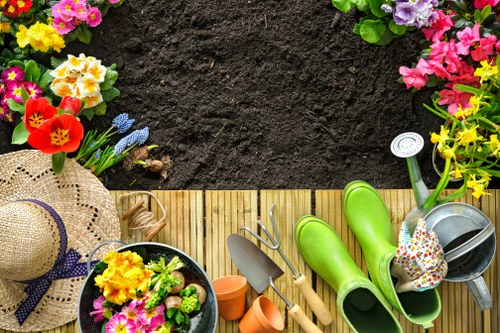Comprehensive Guide to Garden Maintenance in Covent Garden

Covent Garden, renowned for its vibrant atmosphere and historic charm, is not just a hub for tourists and shoppers but also a community that values beautifully maintained gardens. Whether you're a resident or a business owner in Covent Garden, maintaining a lush and healthy garden enhances the aesthetic appeal and provides a serene escape from the bustling city life.
Garden maintenance in Covent Garden involves a combination of regular care, strategic planning, and understanding the unique climatic conditions of the area. With the right approach, you can ensure your garden thrives throughout the year, providing a peaceful retreat and a pleasant environment for visitors.
In this guide, we will explore various aspects of garden maintenance specific to Covent Garden. From soil preparation and plant selection to pest control and seasonal tasks, you'll find all the information you need to keep your garden in top shape.

Understanding Covent Garden’s Climate
The climate in Covent Garden is typically temperate, with mild winters and warm summers. However, the urban environment can lead to microclimates that affect garden care. Understanding these climatic nuances is crucial for effective garden maintenance.
The mild winters mean that plants typically don’t go dormant for extended periods, allowing for year-round gardening activities. However, this also means that gardeners need to be vigilant about pests and diseases that can thrive in such conditions.
Summers can bring heatwaves, so selecting drought-resistant plants and implementing efficient watering systems are essential strategies for maintaining garden health during the hotter months.

Soil Preparation and Health
Healthy soil is the foundation of a thriving garden. In Covent Garden, soil types can vary, so it's essential to test your soil to determine its pH level and nutrient content. This information will guide you in amending the soil to meet your plants' specific needs.
- Soil Testing: Use a soil testing kit or consult a local agricultural extension service to assess soil health.
- Amending the Soil: Based on test results, add organic matter such as compost or well-rotted manure to improve soil structure and fertility.
- pH Adjustment: Most garden plants prefer a slightly acidic to neutral pH. Use lime to raise pH or sulfur to lower it as needed.
Regularly enriching the soil helps retain moisture, suppress weeds, and provide essential nutrients to your plants, ensuring a robust and resilient garden.

Plant Selection for Covent Garden Gardens
Choosing the right plants is crucial for a successful garden. In Covent Garden, consider plants that thrive in temperate climates and can withstand the urban environment.
- Perennials: Plants like lavender, hostas, and daylilies provide long-lasting beauty with minimal maintenance.
- Annuals: For seasonal color, annuals such as marigolds, petunias, and geraniums are excellent choices.
- Shrubs and Trees: Incorporate evergreen shrubs and small trees like boxwood or Japanese maple to add structure and year-round interest.
Additionally, consider native plants that are well-adapted to the local environment, reducing the need for excessive watering and care.

Watering Strategies
Efficient watering is essential, especially during the dry summer months in Covent Garden. Implementing smart watering techniques can conserve water and promote plant health.
- Drip Irrigation: This system delivers water directly to the plant roots, minimizing evaporation and water waste.
- Mulching: Applying mulch around plants helps retain soil moisture and regulate temperature.
- Morning Watering: Watering early in the day reduces evaporation and allows plants to absorb moisture before the heat of the day.
Monitoring soil moisture levels and adjusting your watering schedule based on weather conditions will ensure that your garden receives the right amount of water without overdoing it.
Pest and Disease Management
Urban gardens like those in Covent Garden are susceptible to various pests and diseases. Effective management strategies are essential to maintain plant health and prevent infestations.
Integrate both preventive and reactive measures to address pest problems:
- Regular Inspection: Check plants regularly for signs of pests or diseases to catch issues early.
- Natural Predators: Encourage beneficial insects like ladybugs and lacewings that prey on common garden pests.
- Organic Treatments: Use neem oil, insecticidal soaps, or homemade remedies to manage pests without harmful chemicals.
Maintaining good garden hygiene by removing dead leaves and debris also helps reduce the habitat for pests and diseases.

Pruning and Trimming
Regular pruning and trimming are vital for maintaining plant health and garden aesthetics. Proper pruning encourages growth, removes dead or diseased branches, and shapes plants for a neat appearance.
Key pruning tips:
- Timing: Prune at the appropriate time for each plant species, generally in late winter or early spring.
- Tools: Use sharp, clean tools to make precise cuts and prevent the spread of disease.
- Technique: Remove no more than one-third of a plant at a time to avoid stressing it.
Regular maintenance through pruning not only keeps your garden looking well-kept but also promotes healthier and more vigorous plant growth.

Seasonal Garden Tasks
Each season brings unique challenges and opportunities for garden maintenance in Covent Garden. Adapting your care routine to the changing seasons ensures that your garden remains vibrant and healthy year-round.
Spring
Spring is a time of renewal, perfect for planting new flowers and preparing beds for the growing season.
- Planting: Introduce spring-blooming annuals and perennials to add color to your garden.
- Soil Preparation: Amend garden beds with compost and mulch to enrich the soil.
- Pruning: Trim back shrubs and trees to promote new growth.
Summer
Summer requires diligent watering and protection against pests to keep plants thriving under the heat.
- Watering: Implement efficient watering systems to cope with the heat.
- Pest Control: Monitor for pests and diseases, applying organic treatments as needed.
- Deadheading: Remove spent flowers to encourage continuous blooming.

Autumn
Autumn is the time to prepare your garden for the colder months ahead.
- Leaf Management: Rake and compost fallen leaves to prevent fungal diseases.
- Planting: Plant bulbs for spring blooms and hardy perennials that can withstand winter conditions.
- Cleaning: Remove spent plants and clean garden tools to prevent disease carryover.
Winter
Winter focuses on protecting plants and planning for the next gardening season.
- Protection: Use mulch and protective covers to shield plants from frost and cold.
- Planning: Evaluate garden performance and plan for improvements and new plantings for spring.
By following these seasonal tasks, you can maintain a beautiful and resilient garden throughout the year.

Eco-Friendly Gardening Practices
Implementing eco-friendly practices in your garden not only benefits the environment but also promotes healthier plant growth.
Here are some sustainable gardening techniques suitable for Covent Garden:
- Composting: Recycle kitchen scraps and garden waste into nutrient-rich compost to enhance soil fertility.
- Rainwater Harvesting: Collect rainwater to use for irrigation, reducing reliance on municipal water supply.
- Native Plants: Incorporate native species that require less water and are naturally resistant to local pests.
- Organic Fertilizers: Use natural fertilizers instead of synthetic ones to maintain soil health.
Adopting these practices helps create a sustainable garden that thrives with minimal environmental impact.
Organic Pest Control
Choosing organic methods for pest control ensures that your garden remains healthy without harming beneficial insects or pollinators.
- Biological Controls: Introduce natural predators like spiders and birds to manage pest populations.
- Neem Oil: Apply neem oil to deter a wide range of insects naturally.
- Companion Planting: Grow plants that repel pests next to vulnerable plants, reducing the need for chemical interventions.

Hardscaping and Garden Structures
Incorporating hardscaping elements like pathways, patios, and garden structures can enhance both the functionality and aesthetics of your garden.
Consider the following when planning hardscaping:
- Materials: Use sustainable materials such as reclaimed wood or natural stone to complement your garden.
- Design: Create spaces that facilitate movement and provide focal points, such as seating areas or water features.
- Integration: Ensure that hardscaping elements blend seamlessly with the natural elements of your garden.
Well-planned hardscaping can add structure and interest to your garden, making it a more enjoyable space for relaxation and entertainment.
Professional Garden Maintenance Services
While DIY garden maintenance is feasible, enlisting the help of professional garden maintenance services in Covent Garden can save time and ensure optimal results.
- Expertise: Professionals have the knowledge and experience to handle complex gardening tasks and troubleshoot issues.
- Time-Saving: Outsourcing maintenance frees up your time to enjoy your garden rather than work on it.
- Customized Care: Services can tailor their approach to meet the specific needs of your garden and preferences.
Consider hiring a reputable garden maintenance company to handle tasks such as pruning, soil health management, pest control, and seasonal preparations, ensuring your Covent Garden garden remains vibrant and healthy year-round.
Choosing the Right Service Provider
When selecting a garden maintenance service in Covent Garden, keep the following factors in mind:
- Reputation: Look for reviews and testimonials to gauge the quality of services provided.
- Services Offered: Ensure the company offers the specific services you need for your garden.
- Experience: Choose providers with extensive experience in garden maintenance, particularly in urban environments.
- Sustainability: Opt for companies that use eco-friendly practices and sustainable products.
By carefully selecting a professional service, you can ensure that your garden maintenance needs are met efficiently and effectively.

Enhancing Garden Aesthetics
Aesthetics play a significant role in garden maintenance, transforming a simple outdoor space into a visually appealing sanctuary.
Consider the following elements to enhance your garden's beauty:
- Color Coordination: Plan plantings based on color schemes to create harmonious and vibrant displays.
- Texture Variation: Combine plants with different textures and forms to add depth and interest.
- Focal Points: Incorporate features like sculptures, fountains, or unique plants to draw attention and create visual interest.
Attention to these details ensures that your garden is not only healthy but also a stunning addition to the Covent Garden landscape.
Lighting and Ambiance
Proper lighting can extend the usability of your garden into the evening hours and highlight key features.
- Pathway Lighting: Install lights along walkways to ensure safety and guide visitors through your garden.
- Accent Lighting: Use spotlights to highlight sculptures, trees, or water features.
- Ambient Lighting: Incorporate soft lighting elements like fairy lights or lanterns to create a cozy atmosphere.
Well-planned lighting enhances both functionality and the overall ambiance of your garden, making it a welcoming space at any time of day.

Mulching Techniques
Mulching is a fundamental aspect of garden maintenance that offers numerous benefits, including moisture retention, weed suppression, and soil temperature regulation.
Here are some effective mulching techniques:
- Organic Mulch: Use materials like bark, straw, or compost to enrich the soil as they decompose.
- Inorganic Mulch: Options like gravel or rubber mulch provide long-lasting weed suppression without adding nutrients.
- Application: Spread mulch evenly around plants, maintaining a few inches away from stems to prevent rot.
Regular mulching not only improves soil health but also enhances the overall appearance of your garden by providing a neat and uniform ground cover.
Garden Tools and Equipment
Having the right tools and equipment is essential for effective garden maintenance. Investing in quality tools can make gardening tasks easier and more efficient.
- Basic Tools: Essential tools include pruners, spades, rakes, and watering cans.
- Power Tools: Consider using electric or battery-powered tools like lawnmowers, hedge trimmers, and leaf blowers for larger tasks.
- Storage: Keep tools organized and protected from the elements by using sheds or storage containers.
Proper maintenance of your tools, such as regular cleaning and sharpening, ensures they remain effective and extend their lifespan.

Composting Basics
Composting is an eco-friendly practice that recycles organic waste into nutrient-rich compost for your garden. It reduces landfill waste and provides a sustainable source of fertilizer.
- What to Compost: Include kitchen scraps, garden trimmings, coffee grounds, and eggshells.
- What to Avoid: Refrain from composting meat, dairy, and oily foods to prevent pests and odors.
- Maintenance: Regularly turn the compost pile to aerate it and speed up the decomposition process.
By managing your compost effectively, you can create a valuable resource that enhances soil fertility and supports healthy plant growth.
Weed Management
Weeds compete with your plants for nutrients, water, and light, making weed management a crucial aspect of garden maintenance.
- Manual Removal: Regularly pull weeds by hand to prevent them from establishing and spreading.
- Mulching: Apply a thick layer of mulch to suppress weed growth naturally.
- Herbicides: Use chemical or organic herbicides as a last resort, ensuring they are safe for your garden environment.
Consistent weed control efforts help maintain a clean and healthy garden, allowing your plants to thrive without unnecessary competition.

Creating a Sustainable Garden
Sustainability in gardening focuses on practices that are environmentally friendly and promote long-term health of the garden ecosystem.
Key elements of a sustainable garden include:
- Water Conservation: Implementing efficient watering systems and drought-resistant plants to minimize water usage.
- Biodiversity: Planting a variety of species to encourage a healthy ecosystem and attract pollinators.
- Soil Health: Maintaining fertile soil through composting, mulching, and avoiding harmful chemicals.
Adopting sustainable practices not only benefits the environment but also creates a resilient and self-sustaining garden.
Rain Gardens
Rain gardens are designed to capture and absorb rainwater runoff, reducing the strain on urban drainage systems and preventing water pollution.
- Design: Choose a low-lying area in your garden to install the rain garden, ensuring proper drainage.
- Plant Selection: Use native, water-tolerant plants that can thrive in both wet and dry conditions.
- Maintenance: Regularly check for debris and ensure plants remain healthy to maintain the garden’s functionality.
Incorporating a rain garden into your Covent Garden landscape contributes to environmental sustainability and enhances the visual appeal of your outdoor space.

Permeable Pathways
Permeable pathways allow rainwater to seep through the surface, reducing runoff and promoting groundwater recharge.
Benefits of permeable pathways include:
- Environmental Impact: Helps manage stormwater and minimize pollution.
- Garden Health: Supports soil moisture levels and plant health.
- Aesthetic Appeal: Adds a natural look to your garden with materials like gravel, permeable pavers, or mulch.
Installing permeable pathways is a sustainable choice that enhances both the functionality and beauty of your garden.
Conclusion and Call to Action
Maintaining a garden in Covent Garden requires a blend of knowledge, dedication, and the right practices to ensure its beauty and health year-round. By understanding the local climate, preparing your soil, selecting appropriate plants, and implementing sustainable maintenance strategies, you can create a garden that thrives amidst the urban landscape.
Whether you choose to undertake garden maintenance yourself or enlist the help of professional services, the key is consistent care and attention to detail. A well-maintained garden not only enhances your property's aesthetic appeal but also provides a tranquil retreat in the heart of Covent Garden.
Contact us today to learn more about our professional garden maintenance services and let us help you cultivate the garden of your dreams in Covent Garden.

